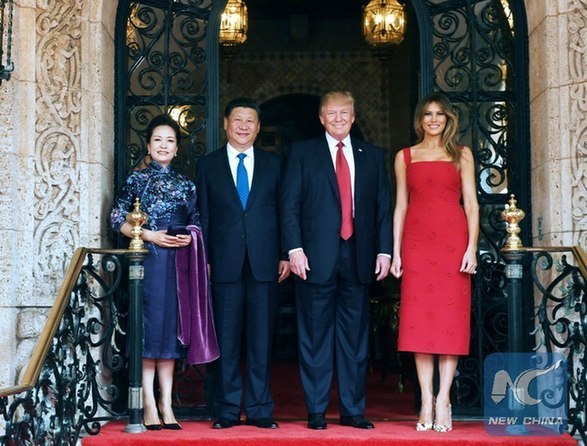New China-US trade deals: A significant progress
- By Rabi Sankar Bosu
 0 Comment(s)
0 Comment(s) Print
Print E-mail China.org.cn, May 16, 2017
E-mail China.org.cn, May 16, 2017
|
|
|
Chinese President Xi Jinping (2nd L) and his wife Peng Liyuan (1st L) pose for a photo with U.S. President Donald Trump (2nd R) and First Lady Melania Trump in the Mar-a-Lago resort in Florida, the United States, April 6, 2017. [Photo/Xinhua] |
Following the 100-day action plan, China and U.S. reached a new 10-point trade agreement over beef, poultry, natural gas imports and exports on May 12, 2017, highlighting the warm ties nurtured by the two very different world leaders. In the words of Chinese Vice Finance Minister Zhu Guangyao, "The deal was a result of cooperation and reflected the expectation of the people of the two countries."
Clearly, the 10-point trade deal is mutually beneficial for many reasons. With the ambit of new trade deal, China will lift its ban on U.S. beef imports no later than July 16 and in exchange, Chinese cooked poultry will be allowed into U.S. supermarkets. So to speak, the U.S. will help satisfy the growing Chinese appetite for U.S. beef and vice versa, cooked Chinese chicken products will head to America to satisfy American consumers' culinary needs.
American beef was banned in China in 2003 after mad cow disease concerns. The new deal certainly benefits the U.S. by giving American beef exporters more access to China's increasingly prosperous middle classes. The Chinese market is estimated to be worth $2.6 billion for the U.S. beef industry. Naturally, U.S. Commerce Secretary Wilbur Ross hailed the agreement as "a herculean accomplishment" forged in record time. Visibly elated Trump tweeted, "China just agreed that the U.S. will be allowed to sell beef, and other major products, into China once again. This is REAL news!"
Surely, under the new plan, the Chinese poultry industry is an obvious winner as the new plan theoretically allows Chinese companies to export China-made chicken back to the U.S. On July 16, the 100th-day after the two presidents' first encounter, the U.S. will issue a proposed rule to allow Chinese cooked poultry to enter U.S. markets. So, this agreement is a positive development and a testament to the Chinese administration's work to break down some of the existing obstacles that have been preventing Chinese cooked poultry products from regaining access to the U.S. market.
Another significant outcome of the 100-day economic action plan is the deal which will allow China getting a greater access to U.S. liquefied natural gas (LNG) exports. China is the world's third largest LNG importer, behind Japan and South Korea.
China is turning more to natural gas as a way to reduce its dependence on coal for generating electricity and combat the country's extensive air pollution. Certainly, the new deal will allow China to diversify its sources of supply and at the same time, it will provide a huge export market for American LNG producers. It could also support direct Chinese investment into liquefaction and upstream developments on U.S. soil.
Under the new plan, China has agreed to give full market access to American electronic payment services providers such as Visa, MasterCard and American Express and is expected to issue implementation guidelines by mid-July. In addition, China will issue both bond underwriting and settlement licenses to two qualified U.S. financial institutions, JPMorgan Chase and Citibank by July 16. The U.S. remains committed to treating Chinese banks the same as other foreign banks.
It is worth mentioning that Trump, a billionaire real estate mogul before he ran for the Oval Office, regularly lambasted China, mainly for economic reasons. Quite clearly, few countries invited the kind of wrath that China did during Trump's presidential campaign in 2016. He said China had "raped the U.S. economy," stealing its jobs. He had threatened to impose massive tariffs on the import of goods from China and label Beijing a currency manipulator, neither of which he has done. However, his tone changed since his inauguration and meeting with Xi in April, calling the Chinese President Xi a "good friend."
Trade protectionism is just a bad idea. A trade war would hurt both countries' economies. Hopefully, President Trump has realized the consequences of a potential trade war with China because the other side would retaliate damaging the American economy. During the superpower summit, as a dealmaker, Trump has made no secret of his desire for a "better" trading relationship with China. Trump's aim to rebuild U.S. infrastructure is an area where China could help. In present times, China has become the fastest-growing export market outside North America for the United States.
It is really an encouraging fact that in 2016, bilateral trade between China and the U.S. reached $519.6 billion, 207 times higher than in 1979 when bilateral diplomatic relations were established. Bilateral trade in services exceeded $110 billion in 2016 with two-way investment surpassing $170 billion. The most authoritative data about Sino-U.S. trade is indicating the unprecedented interdependence and complementarities between the two countries in economic and trade areas.
Hopefully, the two competing nations have made "positive progress" on key issues in their economic dialogue since the Xi-Trump summit in early April this year. It is expected that sound and healthy China-U.S. economic and trade relations will consolidate mutual trust, sweep away obstacles and accomplish something that is great for the sake of the people of China and the U.S., and the world at large.
Rabi Sankar Bosu, Secretary of New Horizon Radio Listeners' Club, West Bengal, India
Opinion articles reflect the views of their authors only, not necessarily those of China.org.cn.







Go to Forum >>0 Comment(s)